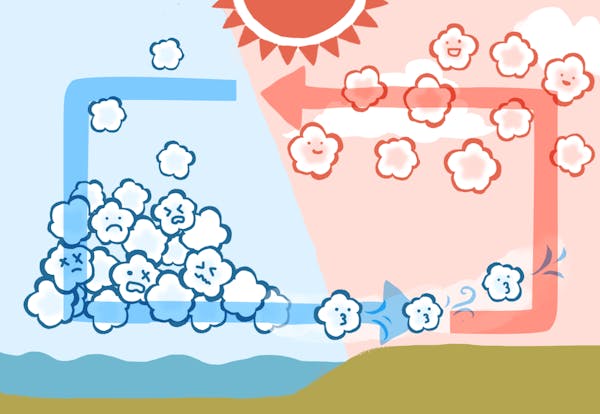Curious Kids: what causes windy weather?
14 March 2018
This is an article from Curious Kids, a series for children. The Conversation is asking kids to send in questions they’d like an expert to answer. All questions are welcome—serious, weird or wacky! See the end of the article for how to ask a question.
What causes windy weather?—Jake, aged 8, Melbourne.
Thank you for your great question, Jake.
Wind is just moving air, and air is a collection of different gases. It’s mostly one type of gas, called nitrogen, but also lots of others, including oxygen – which we need to live.
When air is under pressure, it starts to move – and that causes wind. I’ll explain what I mean by 'under pressure'.
Imagine you are blowing up a balloon. As you blow more air into the balloon, the pressure builds inside. If the pressure gets too great, the balloon could pop because the air has nowhere to move.
Just like the balloon, we don’t like to be under pressure, either. Think of when your brother or sister or slightly annoying cousin gives you a great big bear hug. You feel pressure because you’re getting squeezed. Sometimes that can be nice but when the squeezing gets too much, the best way to get comfortable again is to break free and run. It’s the same with air: when it’s under pressure, it tries to escape.
When the air inside a balloon is under pressure and you take your fingers off the neck part of it, the air rushes out—often with a bit of an embarrassing farty noise. Well, that air rushing out is wind. (And, let’s be honest, it’s why another name for a fart is 'breaking wind').
In the atmosphere, the same thing happens. When pressure builds up in one place, the air rushes to another place where there is less pressure.

Illustration: The air doesn’t like to be under pressure just like us. The wind is the result of the air trying to escape from high pressure. Credit: Mami Kempe/The Conversation, CC BY-ND
But what is causing this pressure in the atmosphere?
Well, as the sun heats up the surface of the earth, some areas get warmer and others stay cooler. On the whole globe, for instance, the north and south poles are really cold. This is because sunbeams pass over the top, so not much sunlight actually hits the ground. Compare this to the equator, where temperatures are really warm, because the sunbeams are hitting it from directly above.
As you may know, warm air rises - just like when you see hot steam coming out the top of your kettle or a cooking pot at home.

Illustration: When pressure builds up in one place, the air rushes to another place where there is less pressure. Credit: Mami Kempe/The Conversation, CC BY-ND
My old teacher used to say 'You don’t get something for nothing, Andrew!' What he meant was that if air goes up in one place, it must come down in another place. That other place will be where the air is not rising, and that’s normally where the cool areas are.
As this happens and the air comes down, it hits the ground and starts to build up. When that air piles up too much, that pile of air will collapse and spread out, just like air rushing out of a balloon.
That air will rush towards the area that doesn’t have a big mound of air built up, and that will usually be a warm place where the air is rising.
You can feel this happening at the beach in summer, where the sun heats up the sand more than the water. As heat builds up the air rises over the land and starts to fall over the ocean. Soon there is more air over the ocean than the land, and a breeze starts as that air pile collapses.
So, put simply, wind is just air moving from one place where there is high pressure to another place where there is low pressure (a smaller pile of air).
Often, that’s from where it is cooler to where it is hotter. And, thankfully, it rarely makes that farty sound.
Read more
Curious Kids: why does rain only come from grey clouds?
Do you have a question?
Hello, curious kids! Have you got a question you’d like an expert to answer? Ask an adult to send your question to The Conversation. They can:
* Email your question to curiouskids@theconversation.edu.au
* Tell the Conversation on Twitter
![]() Please include your name, age, and which city you live in. You can send an audio recording of your question too, if you want. Send as many questions as you like! They won’t be able to answer every question but will do their best.
Please include your name, age, and which city you live in. You can send an audio recording of your question too, if you want. Send as many questions as you like! They won’t be able to answer every question but will do their best.
![]()
This article was originally published on The Conversation. Read the original article.
Author: Andrew B. Watkins, Manager of Climate Prediction Services

Subscribe to this blog to receive an email alert when new articles are published.


Comment. Tell us what you think of this article.
Share. Tell others.